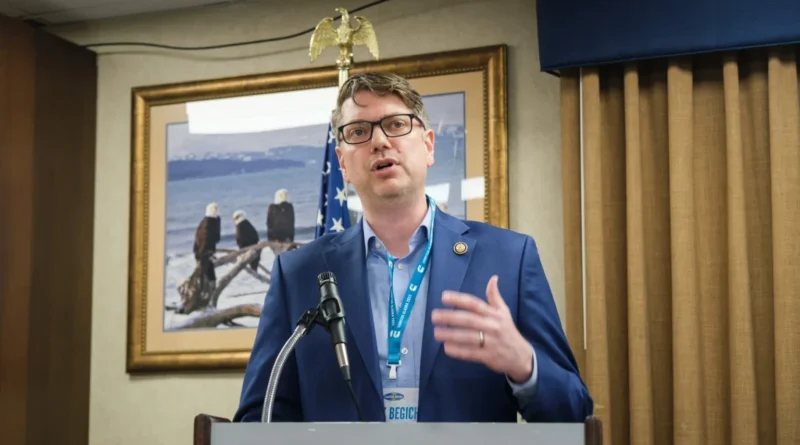Alaska’s congressional delegation addresses federal changes at ComFish 2025
It was standing room only during Sen. Lisa Murkowski’s address at ComFish in Kodiak on Tuesday. Murkowski broke some of the tension with a joke about giving a talk to high schoolers, who she met with ahead of her remarks to the conference.
“My team that was with me said afterwards ‘Toughest interview ever,’ so questions from you guys? Gonna be easy peasy after your high school students,” Murkowski said.
Then she took a turn to talk about the elephant in the room since the Trump administration took over – tariffs.
“We don’t have the certainty that we would like with regards to the tariffs coming out of Washington, D.C. right now. I think the certainty that we know is that even without knowing, even without having the tariffs put in place, we’re already seeing and feeling the impacts on Alaska’s economy and really, the economy as a whole,” she said.
Murkowski said she’s aware that tariffs could increase the costs of consumer goods and how that can be exacerbated in rural places like in Kodiak.
“When we’re talking about the issues that you are all engaged with when it comes to Alaska – seafood and your ability to access and to compete fairly on the global markets – the reality is that tariffs just make everyday life more expensive,” she said.
Murkowski said she’s also concerned about the layoffs at NOAA, particularly as preparations are underway for the summer trawl survey for various species.
She said she’s reminding anyone who will listen why the National Oceanic and Atmospheric Administration’s fisheries departments are important.
Sen. Dan Sullivan has faced criticism recently for not speaking with constituents amidst the federal changes. He called into ComFish via video conferencing this year, and focused on some of the Trump administration’s policies he believes are helping Alaska.
“What I keep doing is brandishing this executive order from the president on Alaska,” Sullivan said. “This thing is all about unleashing Alaska’s economy (and) resources, including fish and our fisheries.”
He said he reminds other officials of that when working with Elon Musk’s controversial Department of Government Efficiency, or DOGE. President Trump and DOGE have already slashed NOAA staff. The administration is proposing massive cuts to the organization’s budget by about $1.5 billion next year.
Sullivan, however, didn’t address the proposed cuts directly.
“I’ve been working with the DOGE guys, the leadership, and when they’ve made mistakes, particularly as it relates to anything in this executive order that’ll hurt Alaska’s economy, including our fisheries,” he said. “I have very strongly advocated for ‘Hey guys, you got to reverse some of this stuff. Can’t do stuff that hurts our economy.’”
He said he’s also trying to work with administration officials on how to provide some consistency for the seafood industry despite the president’s on-again-off-again tariffs. Sullivan said he wants to get fisheries included on a relief program available to farmers negatively affected by trade wars. Although, any efforts to get seafood related support into the farm bill have so far stalled in Congress.
Alaska’s newest member of the congressional delegation, Rep. Nick Begich III, faced criticism during a telephonic town hall early in the Trump administration, and this time spent time in person at ComFish. He told the crowd he’s generally in favor of Trump’s changes and that one of his top concerns for fisheries is to improve domestic markets.
“When it comes to seafood exports, Alaska should have the advantage, not just the level playing field,” Begich said.
He also said he wants to see better representation of Alaska seafood in programs like school lunches and distinguishing Alaska-origin products in stores.
Begich echoed some of the same rhetoric on tariffs as Sullivan. He said it’s unfair for Russia and China to undercut Alaska and sell in U.S. markets.
“We’re looking at ways to harmonize those international standards and ensure that there is full reciprocity,” he said. “When folks want to enter our markets, we should be able to enter their markets on the same terms – that is the backdrop for this tariff discussion.”
Begich said he’s concerned about the national debt and applauded DOGE’s efforts to curb excess spending.

